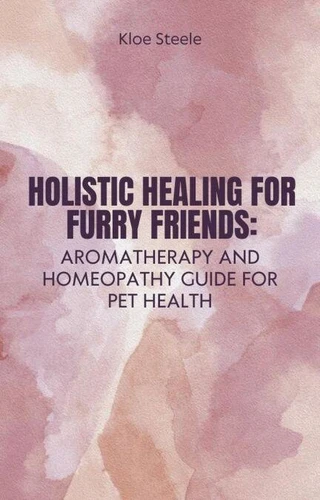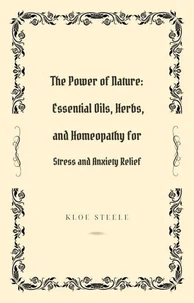Holistic Healing for Furry Friends: Aromatherapy and Homeopathy Guide for Pet Health
Par :Formats :
Disponible dans votre compte client Decitre ou Furet du Nord dès validation de votre commande. Le format ePub est :
- Compatible avec une lecture sur My Vivlio (smartphone, tablette, ordinateur)
- Compatible avec une lecture sur liseuses Vivlio
- Pour les liseuses autres que Vivlio, vous devez utiliser le logiciel Adobe Digital Edition. Non compatible avec la lecture sur les liseuses Kindle, Remarkable et Sony
 , qui est-ce ?
, qui est-ce ?Notre partenaire de plateforme de lecture numérique où vous retrouverez l'ensemble de vos ebooks gratuitement
Pour en savoir plus sur nos ebooks, consultez notre aide en ligne ici
- FormatePub
- ISBN8224816279
- EAN9798224816279
- Date de parution27/01/2024
- Protection num.pas de protection
- Infos supplémentairesepub
- ÉditeurVirtued Press
Résumé
Homeopathy and aromatherapy are alternative approaches that some pet owners consider for managing allergies in their pets. It's important to note that individual responses can vary, and consulting with a veterinarian is crucial before introducing any new treatments. Here's a brief overview of potential benefits associated with homeopathy and aromatherapy for pets with allergies:Homeopathy for Pet Allergies:Holistic Approach: Homeopathy is based on the principle of treating the whole individual rather than just the symptoms.
It aims to stimulate the body's natural healing processes. Individualized Treatment: Homeopathic remedies are often chosen based on an individual pet's specific symptoms, temperament, and overall health. This personalized approach may be beneficial for addressing unique allergic reactions. Reduced Side Effects: Homeopathic remedies are highly diluted substances, which may result in fewer side effects compared to conventional medications.
This can be advantageous for pets, especially those sensitive to traditional treatments. Immune System Support: Some homeopathic remedies are believed to support the immune system, potentially helping the body better cope with allergens and reducing the severity of allergic reactions. Aromatherapy for Pet Allergies:Stress Reduction: Aromatherapy, using pet-safe essential oils, may help reduce stress and anxiety in pets.
Stress can exacerbate allergic reactions, so calming scents may contribute to overall well-being. Anti-inflammatory Effects: Certain essential oils have anti-inflammatory properties, which may assist in soothing irritated skin and respiratory symptoms associated with allergies. Respiratory Support: Aromatherapy oils like eucalyptus or peppermint, when used cautiously and in moderation, may help alleviate respiratory discomfort associated with allergies.
Natural Repellents: Some essential oils have natural insect-repelling properties. By keeping pests at bay, pet owners may help prevent allergic reactions caused by insect bites. Improved Sleep: Calming aromas such as lavender may contribute to better sleep quality, aiding in overall health and resilience against allergy triggers. It's important to approach both homeopathy and aromatherapy with caution, ensuring that any treatments used are safe for pets and administered under the guidance of a qualified veterinarian.
Additionally, what works for one pet may not work for another, so individualized attention is key. Regular veterinary check-ups are crucial to monitor the pet's health and adjust treatment plans accordingly.
It aims to stimulate the body's natural healing processes. Individualized Treatment: Homeopathic remedies are often chosen based on an individual pet's specific symptoms, temperament, and overall health. This personalized approach may be beneficial for addressing unique allergic reactions. Reduced Side Effects: Homeopathic remedies are highly diluted substances, which may result in fewer side effects compared to conventional medications.
This can be advantageous for pets, especially those sensitive to traditional treatments. Immune System Support: Some homeopathic remedies are believed to support the immune system, potentially helping the body better cope with allergens and reducing the severity of allergic reactions. Aromatherapy for Pet Allergies:Stress Reduction: Aromatherapy, using pet-safe essential oils, may help reduce stress and anxiety in pets.
Stress can exacerbate allergic reactions, so calming scents may contribute to overall well-being. Anti-inflammatory Effects: Certain essential oils have anti-inflammatory properties, which may assist in soothing irritated skin and respiratory symptoms associated with allergies. Respiratory Support: Aromatherapy oils like eucalyptus or peppermint, when used cautiously and in moderation, may help alleviate respiratory discomfort associated with allergies.
Natural Repellents: Some essential oils have natural insect-repelling properties. By keeping pests at bay, pet owners may help prevent allergic reactions caused by insect bites. Improved Sleep: Calming aromas such as lavender may contribute to better sleep quality, aiding in overall health and resilience against allergy triggers. It's important to approach both homeopathy and aromatherapy with caution, ensuring that any treatments used are safe for pets and administered under the guidance of a qualified veterinarian.
Additionally, what works for one pet may not work for another, so individualized attention is key. Regular veterinary check-ups are crucial to monitor the pet's health and adjust treatment plans accordingly.
Homeopathy and aromatherapy are alternative approaches that some pet owners consider for managing allergies in their pets. It's important to note that individual responses can vary, and consulting with a veterinarian is crucial before introducing any new treatments. Here's a brief overview of potential benefits associated with homeopathy and aromatherapy for pets with allergies:Homeopathy for Pet Allergies:Holistic Approach: Homeopathy is based on the principle of treating the whole individual rather than just the symptoms.
It aims to stimulate the body's natural healing processes. Individualized Treatment: Homeopathic remedies are often chosen based on an individual pet's specific symptoms, temperament, and overall health. This personalized approach may be beneficial for addressing unique allergic reactions. Reduced Side Effects: Homeopathic remedies are highly diluted substances, which may result in fewer side effects compared to conventional medications.
This can be advantageous for pets, especially those sensitive to traditional treatments. Immune System Support: Some homeopathic remedies are believed to support the immune system, potentially helping the body better cope with allergens and reducing the severity of allergic reactions. Aromatherapy for Pet Allergies:Stress Reduction: Aromatherapy, using pet-safe essential oils, may help reduce stress and anxiety in pets.
Stress can exacerbate allergic reactions, so calming scents may contribute to overall well-being. Anti-inflammatory Effects: Certain essential oils have anti-inflammatory properties, which may assist in soothing irritated skin and respiratory symptoms associated with allergies. Respiratory Support: Aromatherapy oils like eucalyptus or peppermint, when used cautiously and in moderation, may help alleviate respiratory discomfort associated with allergies.
Natural Repellents: Some essential oils have natural insect-repelling properties. By keeping pests at bay, pet owners may help prevent allergic reactions caused by insect bites. Improved Sleep: Calming aromas such as lavender may contribute to better sleep quality, aiding in overall health and resilience against allergy triggers. It's important to approach both homeopathy and aromatherapy with caution, ensuring that any treatments used are safe for pets and administered under the guidance of a qualified veterinarian.
Additionally, what works for one pet may not work for another, so individualized attention is key. Regular veterinary check-ups are crucial to monitor the pet's health and adjust treatment plans accordingly.
It aims to stimulate the body's natural healing processes. Individualized Treatment: Homeopathic remedies are often chosen based on an individual pet's specific symptoms, temperament, and overall health. This personalized approach may be beneficial for addressing unique allergic reactions. Reduced Side Effects: Homeopathic remedies are highly diluted substances, which may result in fewer side effects compared to conventional medications.
This can be advantageous for pets, especially those sensitive to traditional treatments. Immune System Support: Some homeopathic remedies are believed to support the immune system, potentially helping the body better cope with allergens and reducing the severity of allergic reactions. Aromatherapy for Pet Allergies:Stress Reduction: Aromatherapy, using pet-safe essential oils, may help reduce stress and anxiety in pets.
Stress can exacerbate allergic reactions, so calming scents may contribute to overall well-being. Anti-inflammatory Effects: Certain essential oils have anti-inflammatory properties, which may assist in soothing irritated skin and respiratory symptoms associated with allergies. Respiratory Support: Aromatherapy oils like eucalyptus or peppermint, when used cautiously and in moderation, may help alleviate respiratory discomfort associated with allergies.
Natural Repellents: Some essential oils have natural insect-repelling properties. By keeping pests at bay, pet owners may help prevent allergic reactions caused by insect bites. Improved Sleep: Calming aromas such as lavender may contribute to better sleep quality, aiding in overall health and resilience against allergy triggers. It's important to approach both homeopathy and aromatherapy with caution, ensuring that any treatments used are safe for pets and administered under the guidance of a qualified veterinarian.
Additionally, what works for one pet may not work for another, so individualized attention is key. Regular veterinary check-ups are crucial to monitor the pet's health and adjust treatment plans accordingly.













